We Reviewed the Best Jotform Alternatives for Creating Forms That Convert
Jotform, like every other form builder, has pros and cons.
While it offers many useful features, it also has flaws like support issues, technical glitches, navigation concerns, and limited functionality that might make it less effective (depending on your needs). If any of these sound like dealbreakers, it might be time to look into a few Jotform alternatives.
In this Growform guide, we’ll explore ten alternatives to Jotform that you can consider.
But first…
Why Listen to Us?
At Growform, we’re the go-to form-builder for hundreds of businesses in industries like SaaS, solar, and insurance.
Our customers are seeing amazing results, too. BeMarketable 3X-ed their conversion rates after switching to Growform, and Linear was able to double their form fields while still improving form conversions.
We’re not here to bash Jotform. However, we know from experience that it isn’t the right tool for every business. So, without further ado, let’s dive in.
What Is Jotform?
Jotform is an online form builder that lets you create custom forms without coding knowledge. It’s been a popular option since 2006—so it’s definitely not a new player in the game.
With Jotform, there are three ways to create and manage forms:
- Build one from scratch with the no-code, drag-and-drop builder
- Customize one of Jotform’s 1,000+ templates
- Import an existing form from tools like Google Forms
This (combined with the features we’ll cover below) makes Jotform a great generalist form-building tool. It isn’t designed for any specific use case (like lead capture, for example), so it’s able to work in all kinds of scenarios.
Key Features
- Wide Range of Form Fields: Different form fields, such as text boxes, multiple-choice questions, dropdowns, and file uploads, can be used in (almost) any data collection scenario.
- Form Logic: With conditional logic, your forms can adapt to user input.
- Integrations: Integrates seamlessly with popular tools like email marketing platforms and payment processors.
- Widget Elements: Add extra flair to your forms with features like e-signature and terms and conditions.
- Drag-and-Drop Builder: Add and arrange various form fields with a few clicks.
Pricing
Jotform offers a free plan that limits users to five forms and 100 monthly submissions.
Paid plans start at $34/month and grant users higher form limits, more monthly submissions and views, and additional storage space for responses.
Why Consider Jotform Alternatives?
Customer Support Issues
Customer support with Jotform can be hit or miss. Sure, they offer a forum and plenty of self-help resources, which is great. But when you need to reach a support rep, you’ll often get automated bot responses that don’t solve your problem.
If personalized customer support is important to you, consider exploring alternatives that make customer satisfaction more of a priority.
Navigation Concerns
Jotform can be overwhelming to navigate. You’ll often find yourself making a bunch of clicks to perform basic form-building tasks like adding a prefill. Important tools are buried deep in settings menus, making it tedious to find what you need.
It’s not exactly the smoothest form-building experience out there!
Lack of Focus
For some, Jotform’s lack of niche focus is a plus. For others, it’s definitely a limitation.
Jotform simply doesn’t offer the specific features needed for highly specialized form use cases like lead capture, recruiting, or event registration. For example, alternatives like Growform help sales teams streamline lead gen thanks to deep integrations with CRMs like Attio and Agile CRM.
10 Best Jotform Alternatives For Building Effective Forms
- Growform
- Wufoo
- Formstack
- Google Forms
- Typeform
- Zoho Forms
- Tally
- WPForms
- Feathery
- Cognito Forms
1. Growform
Growform is a form builder that helps you create beautiful, highly effective multi-step forms without technical skills or coding experience.
With our drag-and-drop editor, you can build your form from scratch or customize one of our templates. Once you’re done, you can easily embed the form anywhere using one of three HTML embed methods.
Unlike Jotform (and many other big-name form builders), we take a highly personalized approach to customer support. If you need help building, implementing, or troubleshooting a form, we’ll go as far as connecting you directly with our founder to address the issue quickly.
Plus, while Jotform paywall features like unlimited forms, fields, views, and conditional logic behind premium plans, we include all these features in all plans. Because (believe it or not) small businesses sometimes need to create long, complex forms, too!
Key Features
- Multi-step forms builder: Break down complex forms into easy-to-digest steps.
- Checkboxes: Allow users to select multiple options from a set of choices.
- Custom style and design: Design forms that match your brand identity for a cohesive look.
- Hidden fields: Capture additional data without cluttering the form for users.
- Form embed: Easily integrate your form into any website using various embedding methods.
- Notifications: Stay informed with instant email alerts whenever someone submits a form.
- Responsive: Ensure your forms look great and function flawlessly on any device.
- Validation: Set rules to ensure users enter the correct information in the format you require.
- Integrations: Integrate with hundreds of CRMs, databases, and marketing tools.
Pricing
Want to test Growform out? We offer a 14-day risk-free trial.
Our paid plans start at $35.99 monthly. This allows you to create unlimited forms, capture up to 300 leads monthly, and embed your form on one domain. We also offer plans for agencies that need to embed forms on multiple domains and custom plans for high-volume needs.
Pros
- Easy to use with an intuitive drag-and-drop builder
- Conversion-focused forms
- Responsive customer support
- You don’t need any technical background
Cons
- No free plan
Looking for a better option? Explore the top Microsoft Forms alternatives to create more powerful and flexible online forms.
2. Wufoo
Wufoo is a Jotform alternative that makes creating online forms and surveys super easy—whether they’re for lead gen, registrations, or some other purpose.
It offers a huge selection of templates to help you design your forms. Unsurprisingly, many of these templates are geared towards surveys (the parent company is SurveyMonkey). However, if you opt to build your own forms, you can access some very useful features like payment processing and file uploads.
Key Features
- Form Translation: Ensure your message is clear when creating forms in different languages.
- Form Manager: Keep all your forms, payments, and their statuses organized in one place.
- Reporting and Analytics: Gain detailed insights into form responses.
- Integration: Connect your forms to over 1,500 apps using Zapier.
Pricing
There’s a free plan available that lets you create up to five forms and receive 100 entries monthly.
Paid plans start at $14.08/month, offering more forms, entries, and fields. For unlimited forms, the cost is $29.08/month.
Pros
- Intuitive drag-and-drop interface
- Extensive options for form design
- Built-in reporting tools
- Responsive support
Cons
- Some users find the interface outdated
- Complicated embedding options
- Limited in-app guides
3. Formstack
Formstack is a capable, user-friendly form builder that effortlessly meets most form-building needs.
It also comes with a theme builder, giving you total control over your form’s appearance with control over animations, buttons, colors, and more. By making changes to a theme, you can easily adjust your entire form without manually adjusting each element—something that gets old quickly.
Key Features
- Multilingual Support: Covers up to 36 languages, including Arabic and Chinese.
- Conditional Logic: Create dynamic forms that adapt to different user responses.
- Theme Builder: Customize your form’s design and layout without coding.
- Payment Processing: Accept payments through popular gateways like PayPal, Stripe, and Authorize.Net.
Pricing
Formstack offers a 14-day free trial. After that, the basic plan starts at $59 per month, allowing you to create up to 20 forms and receive 1,000 submissions per form.
Pros
- Ideal for complex form needs
- High-level data protection
- Extensive library of guides and walkthroughs
- Easy to use
Cons
- No free plan and lower-priced plans can be restrictive
- Can be pricey
4. Google Forms
Google Forms is an online form builder with an incredibly low barrier to entry. All you need is a Google account. So, if you need to gather data quickly without extensive technical knowledge, it’s a solid choice to consider.
As part of the Google Workspace suite, Google Forms integrates seamlessly with other Google apps like Google Sheets, Google Drive, and Google Calendar.
Key Features
- Template Gallery: Don’t want to build your forms from scratch? Pick a template and customize it.
- Real-Time Collaboration: Multiple users can work on the same form simultaneously.
- Automated Data Collection: Responses are automatically collected and organized in Google Sheets.
- Customizable Themes: Personalize your forms with different themes and images.
Pricing
Google Forms is free, with no paid tiers or premium features.
Pros
- Free to create and manage forms
- User-friendly interface suitable for all skill levels
- Integrates well with other Google Workspace tools
Cons
- Customization options are basic compared to some other tools
- Limited features compared to competitors like Growform
5. Typeform
Typeform is a no-code form builder that offers a powerful, conversational form-building experience.
Has the conversational form fad settled down a bit? Yes. However, that doesn’t mean Typeform is a bad option by any stretch of the imagination. It offers tons of features, a great builder, and lots of integrations that extend its functionality even further.
Key Features
- Customizable Design: Extensive design options to match your brand’s look.
- Conditional Logic: Guides respondents through different paths based on their answers.
- Third-Party Integrations: Connects with apps like Slack, Google Sheets, and Mailchimp.
Pricing
Typeform offers a free tier with basic features. Paid plans start at $29/month for the Basic plan, which includes 100 responses and unlimited form creation. You can save more with the yearly plan.
Pros
- Quick and easy to use
- Highly customizable to fit your brand’s needs
- Robust logic and integration options
- Optimized for all devices
Cons
- Paid plans can be expensive for small businesses or individuals
6. Zoho Forms
Zoho Forms is a versatile online form builder designed to help businesses create and manage forms effortlessly. With its intuitive drag-and-drop interface, users can design custom forms tailored to various needs, from lead generation to customer feedback. The platform offers a range of templates and themes, ensuring forms are both functional and visually appealing. Additionally, Zoho Forms integrates seamlessly with other Zoho applications and third-party services, enhancing its utility in diverse business workflows.
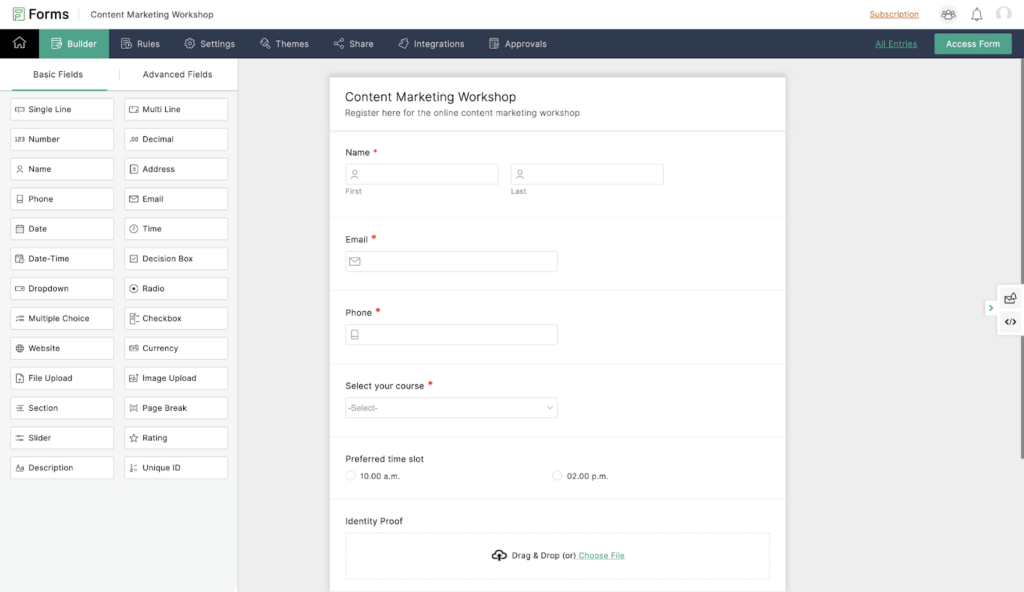
Key Features
- Drag-and-Drop Builder: Easily add and arrange form fields without any coding knowledge.
- Conditional Logic: Show or hide fields based on user responses to create dynamic forms.
- Multi-Page Forms: Break lengthy forms into manageable sections to improve user experience.
- Payment Integration: Collect payments directly through forms using gateways like PayPal and Stripe.
- Mobile App Access: Create and manage forms on the go with apps available for iOS and Android.
Pricing
- Free Plan: Includes 1 user, 3 forms, unlimited form views, 500 submissions per month, and 200 MB file storage.
- Basic Plan: Priced at $8/month (billed annually), it offers 1 user, unlimited forms, 10,000 submissions per month, and 500 MB storage.
- Standard Plan: At $20/month (billed annually), this plan provides 10 users, 25,000 submissions per month, and 2 GB storage.
- Professional Plan: For $40/month (billed annually), users get 25 users, 75,000 submissions per month, and 5 GB storage.
- Premium Plan: At $80/month (billed annually), it includes 100 users, 150,000 submissions per month, and 10 GB storage.
Pros
- Seamless integration with Zoho ecosystem enhances workflow efficiency
- Highly customizable form design allows branding and professional appearance
- Mobile-friendly and offline access enables data collection anywhere
- Intuitive drag-and-drop interface simplifies form creation for all skill levels
- Powerful automation and conditional logic streamline complex data collection
- Direct integrations with third-party apps improve data flow and CRM usage
Cons
- Limited template options make it difficult for non-designers to create unique forms
- Form logic settings require separate navigation, making editing less intuitive
7. Tally
Tally is a free, intuitive form builder that enables users to create online forms effortlessly, without any coding knowledge. Designed to function like a text document, Tally allows you to simply start typing your questions and insert blocks as needed, streamlining the form creation process.
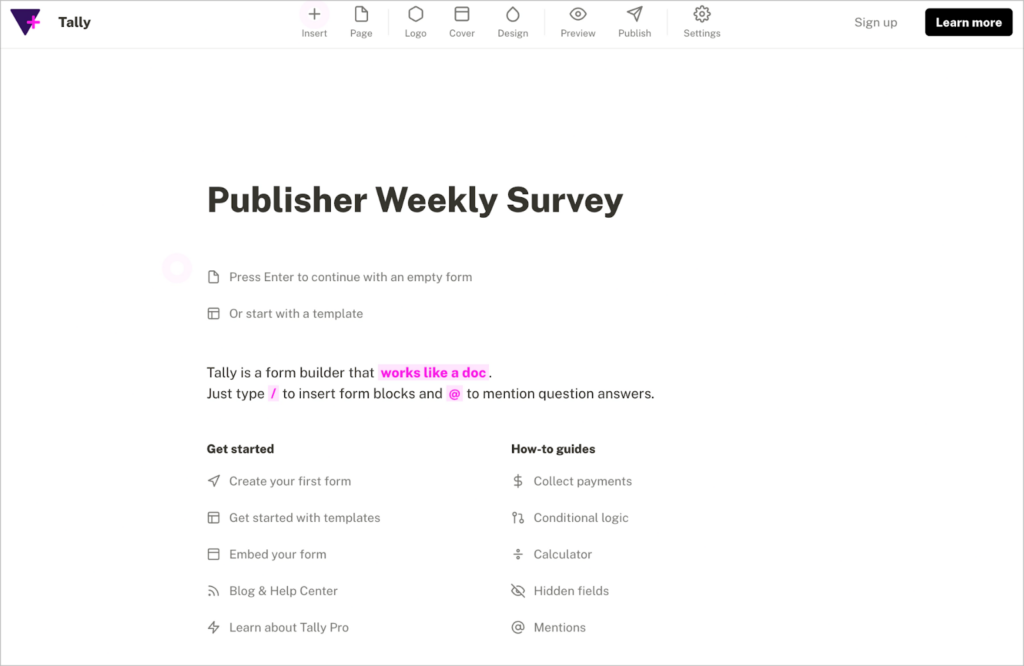
Key Features
- Unlimited Forms and Submissions: Create and collect as many forms and responses as you need, free of charge.
- Advanced Input Blocks: Collect diverse data types, including contact information, file uploads, e-signatures, and payments, facilitating the creation of various forms from surveys to lead generation.
- Conditional Logic: Build dynamic forms that adapt based on user inputs, enhancing the respondent experience.
- Calculator: Utilize variables to create dynamic content and perform calculations within your forms, such as scores or prices.
- Customization Options: Tailor your forms to match your brand by adjusting colors, fonts, and layouts, or by injecting custom CSS for full design control.
Pricing
- Free Plan: Unlimited forms & responses, basic integrations, and core features.
- Tally Pro ($29/month): Custom domains, team collaboration, and advanced integrations.
- Tally Business ($89/month): Data retention controls, email verification, and dedicated support.
Pros
- Exceptionally generous free plan with unlimited forms & responses
- Seamless Notion integration for data collection and management
- Powerful conditional logic & calculations enable dynamic, interactive forms
- Easy-to-use document-style form builder with no coding required
- Frequent feature updates & active support team for ongoing improvements
- Multi-language support for global accessibility
Cons
- Some integrations require Zapier instead of direct API connections
- Limited pre-built templates compared to competitors like Typeform
8. WPForms
WPForms is a user-friendly WordPress plugin designed to simplify the process of creating various types of forms, such as contact forms, online surveys, donation forms, and order forms, without the need for coding. Its intuitive drag-and-drop builder and extensive library of over 2,000 pre-built templates make form creation accessible to users of all skill levels.
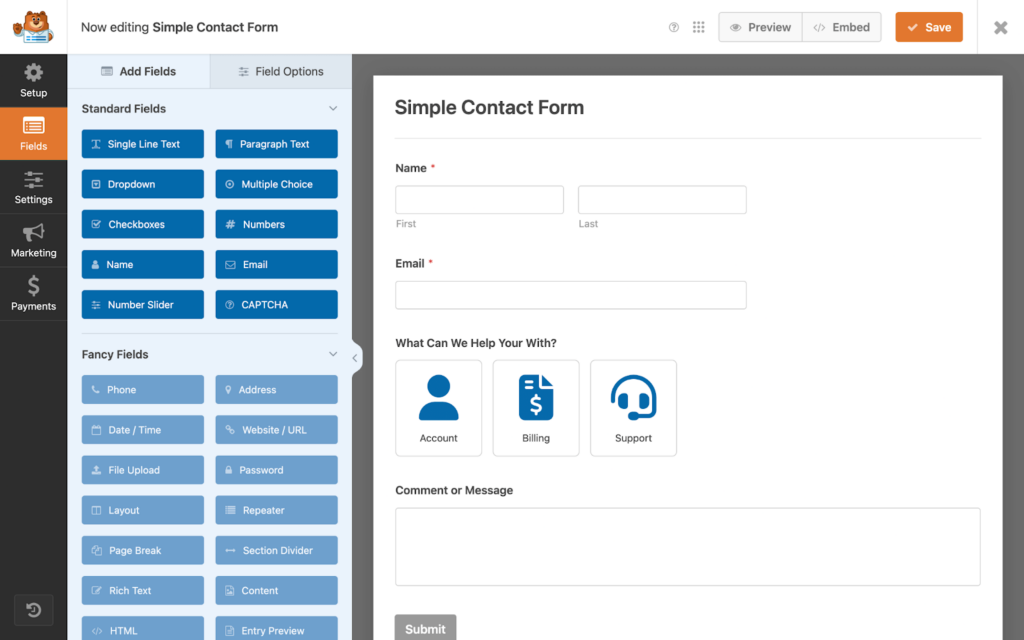
Key Features
- 2,000+ Form Templates: Access a vast selection of pre-built templates to save time and improve workflow.
- Mobile-Friendly Forms: Ensure forms are 100% responsive, automatically adapting to look great on all devices.
- Smart Conditional Logic: Personalize forms based on user input by showing or hiding fields dynamically.
- Form Notifications: Set up automated, customizable emails to notify stakeholders when forms are submitted.
- Entry Management: View all leads, payments, and form data in one centralized location to streamline workflow.
- Surveys & Polls Addon: Create online surveys and polls with features like NPS scoring, Likert fields, and real-time poll results.
- File Uploads and Digital Signatures: Collect file uploads and electronic signatures directly through forms.
- Spam Protection: Utilize anti-spam tools to prevent unwanted submissions.
Pricing
- Elite Plan ($299.50/year): This plan supports unlimited sites and includes premium integrations like Salesforce, HubSpot, and Authorize.Net.
- Pro Plan ($199.50/year): Allows usage on up to 5 sites and includes advanced form features like surveys, polls, and lead forms.
- Plus Plan ($99.50/year): Supports up to 3 sites and offers email marketing integrations with platforms like Mailchimp and AWeber.
- Basic Plan ($49.50/year): Includes a 1-site license with unlimited forms and submissions. It also provides essential tools like conditional logic, file uploads, entry management, and spam protection.
Pros
- The WP Mail SMTP integration ensures that form submissions don’t get lost
- Automates customer inquiries and sign-ups efficiently, reducing manual work
- The drag-and-drop builder and diverse templates make setup quick and easy
- Simplifies online payments directly through forms
- Works seamlessly with WordPress, making it a go-to plugin for WP users
Cons
- Users find it cumbersome to navigate and modify logic-based fields
- While the interface is user-friendly, deeper customization relies heavily on CSS
9. Feathery
Feathery is a highly customizable form builder designed for businesses that need advanced workflows and deep integrations. It allows users to create pixel-perfect forms with complex logic, API connectivity, and enterprise-grade security. Feathery is particularly popular among fintech, SaaS, and healthcare companies that require compliance-ready and automation-friendly forms.
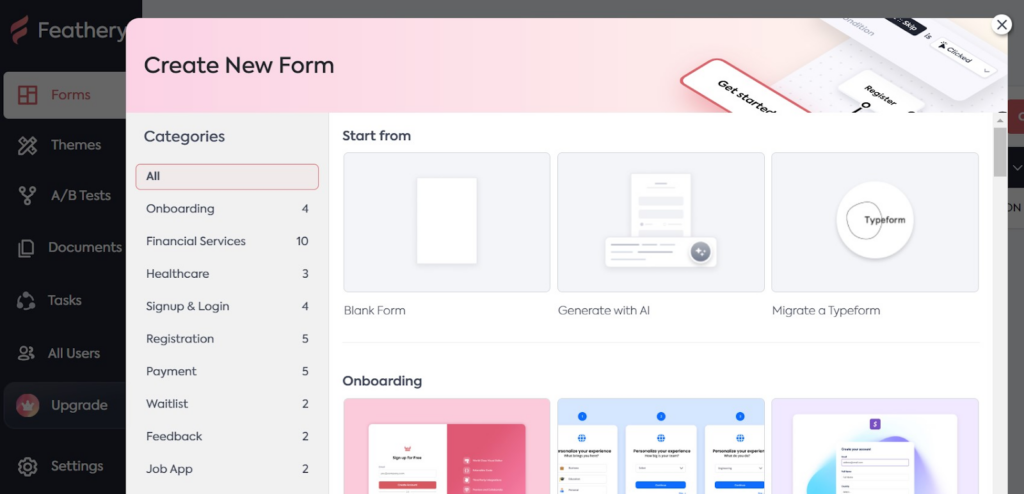
Key Features
- Pixel-perfect design: Fully customize form layouts, branding, and styling without restrictions.
- Advanced logic & automation: Implement conditional branching, multi-step flows, and automated actions.
- API and webhook support: Seamlessly integrate with CRMs, databases, and other business tools.
- Data security & compliance: Offers encryption, SOC 2 compliance, and HIPAA support for secure data collection.
- Built-in analytics: Monitor form performance with user interaction tracking and insights.
Pricing
- Free Plan: Includes up to 500 monthly submissions, five live forms, and 100 emails per month.
- Paid Plans: Not publicly available online. Must book a demo first.
Pros
- Supports API integrations and automated workflows
- Ensures secure data handling with HIPAA and SOC 2 compliance
- Allows pixel-level customization for branded forms
- Seamlessly connects with CRM, payment gateways, and analytics
- Ideal for onboarding, surveys, and applications
- Suitable for both technical and non-technical users
Cons
- Requires more manual customization compared to other form builders
- Native integrations are fewer compared to larger platforms
10. Cognito Forms
Cognito Forms is a feature-rich form builder that offers advanced functionality for businesses needing powerful automation, calculations, and secure data collection. It’s widely used for applications, payment forms, and business workflows, thanks to its ability to generate documents, integrate with third-party tools, and enforce security measures like HIPAA compliance.
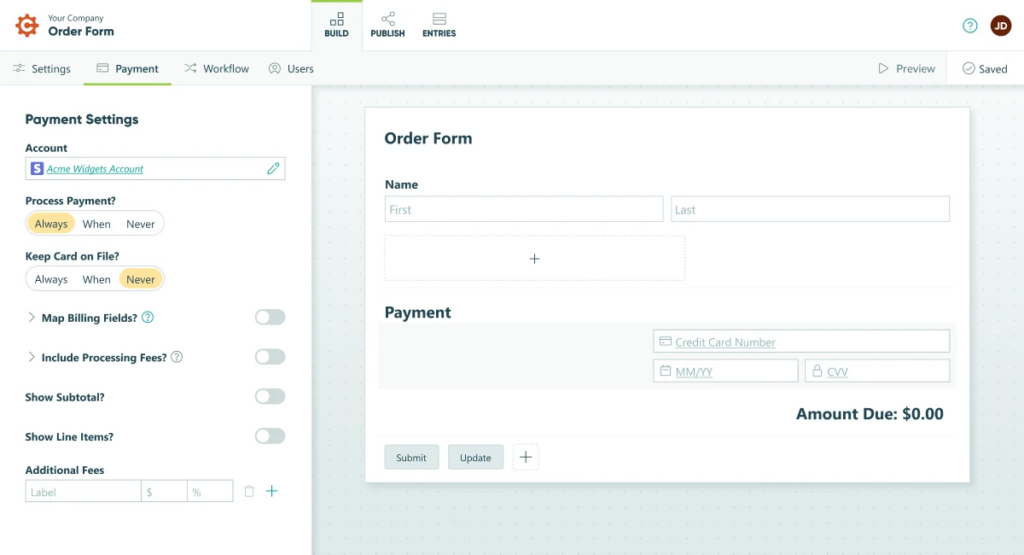
Key Features
- Conditional logic and calculations: Create dynamic forms that adapt based on user input.
- Multi-user collaboration: Assign different roles and permissions to manage form access.
- Secure data collection: Supports HIPAA compliance and encryption for sensitive information.
- Document automation: Generate PDFs and reports automatically from form submissions.
- Payment processing: Accept online payments through integrations with Stripe and PayPal.
- Seamless third-party integrations: Connect with Zapier, Microsoft Power Automate, and CRMs.
Pricing
- Free: for 1 user, 500 entries/month, and 100MB storage.
- Pro: $19/month for 2 users, 2,000 entries/month, and 1 GB storage.
- Team: $39/month for 5 users, 10,000 entries/month, and 10 GB storage.
- Enterprise: $129/month for 20 users, unlimited entries, and 100 GB storage.
Pros
- Ideal for pricing forms, order quotes, and applications
- HIPAA compliance and encryption ensure privacy
- Creates contracts and reports from form responses
- Reduces form abandonment by breaking questions into steps
- Teams can assign permissions for different access levels
- Accepts payments without requiring extra plugins
Cons
- Fewer design options compared to competitors
- Some basic functions need third-party tools to accomplish them
Choosing the Best Jotform Alternative
While Jotform is a solid form builder, it has flaws. If you’re searching for alternatives, this guide offers ten solid options that address them.
If you’re looking for a multi-step form builder that offers the best bang for your buck, look no further than Growform. We offer competitive prices, top-notch features, and customer support that’s always ready to help.
Ready to give Growform a try? Start with a 14-day free trial—no credit card required.
Recent Posts
- Your Guide to Using Webflow Form Builder Effectively
- Top 5 Lead Capture Form Examples That Can Boost Your Conversions (2025)
- What Is an Elementor Multi-Step Form & How Does Growform Improve It?
- We Review The Best Microsoft Forms Alternatives for Better Customization and Control
- Here’s Our Review of the Best Form Builders For WordPress Sites
